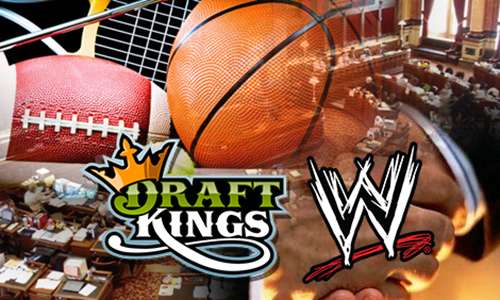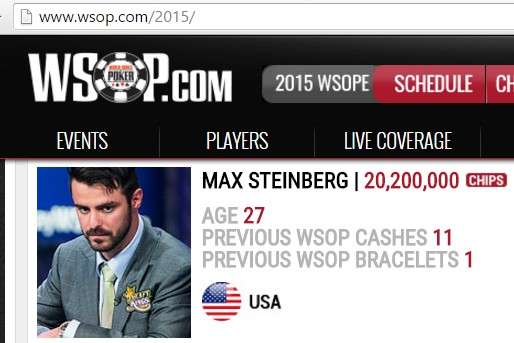Ad Partnerships Dissolve as DFS Crisis Impacts Poker, Gambling Worlds
The ongoing legal crisis facing the United States-centered daily fantasy sports (DFS) continues to create ripples well beyond the DFS sphere itself, with advertising deals in other forms of gambling being rethought, and, in some cases, cancelled, due to the impact of the DFS situation upon the greater gambling world.
 Nowhere can that be seen more directly than in this week’s mutual decision by DFS market co-leader DraftKings and the Caesars Entertainment-owned World Series of Poker to immediately stop all DraftKings advertising within WSOP events and venues. The interruption was initiated by DraftKings, but it doesn’t seem as if Caesars or the WSOP was too bothered, given the recent opinion put forth by the Nevada Gaming Commission that DFS is in fact a form of sports betting and thus must be licensed by the state. Whether the cessation of the DraftKings-WSOP deal is permanent isn’t quite clear, but with the WSOP’s “November Nine” main-event finale set to take place in just a couple of weeks, the absence of DraftKings ads is likely to be very noticeable.
Nowhere can that be seen more directly than in this week’s mutual decision by DFS market co-leader DraftKings and the Caesars Entertainment-owned World Series of Poker to immediately stop all DraftKings advertising within WSOP events and venues. The interruption was initiated by DraftKings, but it doesn’t seem as if Caesars or the WSOP was too bothered, given the recent opinion put forth by the Nevada Gaming Commission that DFS is in fact a form of sports betting and thus must be licensed by the state. Whether the cessation of the DraftKings-WSOP deal is permanent isn’t quite clear, but with the WSOP’s “November Nine” main-event finale set to take place in just a couple of weeks, the absence of DraftKings ads is likely to be very noticeable.
DraftKings was a major sponsor of the WSOP all summer, and even included satellite DFS tournaments in New Jersey and Nevada on its own site which awarded WSOP main-event buy-ins as prizes. The heavy poker crossover at DraftKings is an inherent part of its history, as the site was founded by poker-familiar entrepreneurs and several online-poker players accepted prominent positions with the company early on. DraftKings even hosted a branded player’s lounge and mid-WSOP party during this summer’s Las Vegas poker festivities.
Said the WSOP’s Seth Palansky, earlier this week, “In light of last week’s news in Nevada, DraftKings asked us to cease any sponsorship activities around the remaining few WSOP events of the year, and we complied.” The statement leaves open the possibility for both sides to resume an ad deal if DraftKings and the DFS industry in general emerge from the legal and regulatory storm which has blanketed that market in recent weeks.
The addus interruptus also may have an effect on one of the remaining November Nine players, Max Steinberg. Steinberg, as fate would have it, was among the fortunate few who won his way to the WSOP main event via one of those DraftKings saties, and he’s since parlayed that buy-in into a very playable stack at the final table. Steinberg, though, has been heavily patched by DraftKings throughout, and that arrangement was very much expected to continue through next month’s finale. Instead, it’s very possible that Steinberg will show up at November Nine patch-free.
Philadelphia 76ers, PartyPoker End Partnership
The DraftKings situation with the WSOP might be one of the most direct examples of the ripple effects caused by DFS’s ongoing troubles, but it’s far from the only one. Take, for instance, the situation in Philadelphia, where that city’s National Basketball Association (NBA) franchise, the Philadelphia 76ers, has just announced the termination of its ad deal with online-gambling industry giant PartyPoker.
When announced last year, the deal represented a major investment for bwin.party in a market where the company hoped to establish a toehold. Philly is just across the border from New Jersey, drawing many of its fans there, and the Borgata-branded PartyPoker offerings in New Jersey’s regulated online-gambling market are among that state’s most successful to date, in terms of market share.
The ending of the Sixers-Party deal, according to a Philly.com report, is attributed to the increased presence of the DFS space amid the general awareness of the American sports public, and the failure of sports-betting and poker firms such as Party to expand their legal US footprint.
Except that can’t be quite the whole story. It appears as though 76ers owner Josh Harris is hedging his bets after assessing the situation with several of the principals involved. Harris is canceling the deal with Party for the 76ers, which includes advertising at the Forum and other Pennsylvania venues, and Harris and the 76ers also have a major ad deal with — you guessed it — DraftKings. However, Harris also owns the NHL’s New Jersey Devils. The Devils also have an ad deal with Party, and for the time being, that deal remains intact.
Even more to the point, the NBA among all of the US’s major sports associations has been most direct in its continued support for the DFS space. The NFL has been just as active, if more behind the scenes, by attempting to quash planned future hearings at the federal US level over DFS’s legality. The NBA and the NFL contrast sharply against the amateur-level NCAA, which wants no association with the DFS market.
Staying with Party in New Jersey while dropping the Pennsylvania partnership makes sense in several different ways. New Jersey is taking the lead in its attack on the DFS industry while pushing forward its own pro-sports betting, anti-PASPA agenda. Pennsylvania is still wrestling with various introductory legislative initiative regarding online gambling, none of which are likely to come to fruition in the near future.
Then there’s Party, or rather, bwin.party, which isn’t really Party any more. Following the recent sale of the company to GVC Holdings, that company’s short-term goals may have changed as well. There’s also the chance within that deal that bwin.party’s poker offerings may be sold again, to Amaya, and Amaya has shown little interest in pushing itself into dicey legal situations in US state-level activities. The whole Amaya possibility remains just an outlier, but it’s a possible piece that would be complimentary to all these other moves.
The Pennsylvania ad deal ending might not seem very close to the WSOP-DraftKings breakup in Nevada, but in another way it is. Online gambling is occurring within most US states, but the form remains something of a mosh pit. Within all that, ad deals are being formed and breaking apart on the fly; the firms in the industry know they have to market themselves somewhere, but exactly where that “somewhere” is can change on a weekly basis.
And so we see the changing deals, the forming of new plans and the short-circuiting of older channels that likely won’t be panning out. It’s an ongoing process.





















COMMENTS